Introduction
Canadians for a Sustainable Society commissioned Leger Market Research to conduct a large and thorough poll on the Canadian public’s thoughts on what they want and what current policy is actually delivering. The results are striking. Below we provide a summary of the results of the poll, which can be viewed in its entirety following this introduction.
- Canadians value access to nature, equality and the rule of law.
- Canadians value the quality of life over a larger economy.
- These results are diametrically opposed to the endless growth, developer/finance policies currently in place which fly in the face of demands for environmental balance and food and energy resilience, and now, as revealed by this survey, even with basic democratic principles.
- This is the largest poll on what Canadians want and how they see past and future trends. Here are 1500 responders answering over 25 questions that our developer/speculator-biased media corporations will not deal with.
The Conversation
Clearly there is no democratic support for mass immigration or its impacts. This can be no surprise to anyone outside of the media/political class but this poll illustrates just how disconnected from democratic (and environmental and fiscal) reality the national conversation has become. The poll provides hard numbers which should enable individuals to stand up and call out the misdirected policy and the corruption that underpins it, which is now so pervasive and dominant in Canada.
Almost certainly these poll results reflect public opinion in other countries which have followed a reckless growth-at-any-cost strategy such as the UK, Australia and the USA and have produced the same social and environmental results.
Over the past 5 decades the concept of good government has been pushed aside by interests whose agenda is to make Canada nothing more than a commercial market rather than a nation and to treat its people as consumers, rent-payers and cheap labour rather than citizens.
Thus, the manipulated national conversation has been misdirected to focus on the growth of the commercial economy and asset inflation (“the wealth effect”, “asset enhancement”, “good for the economy” etc., etc.) as opposed to human well-being, environmental health and quality of life. Obviously there is no democratic support for what has become a developer (colonizer) economy.
We invite you to make up your own mind. Have a look through a sample of the results below and then examine the full poll results in greater detail. Researchers may request the fully detailed poll results in Excel format.
Please look through a sample of the results and then examine the full poll results in greater detail. Hold these results out to business-as-usual media politicians promoting the failed and corrupt model of endless growth. Researchers may request the fully detailed poll results in Excel format.
Sample of Leger Poll results commissioned by Canadians for a Sustainable Society

Very high support for factors directly negatively impacted by a growing population.
Low support for a larger population and higher consumption.
25% of young adults have been forced to move by rent inflation. (“asset appreciation”)
Less than 20% support using immigration to change Canada’s culture and ethnic mix.
Less than 15% support importing cheap labour.
Quality of Life: Over 50% think it has declined vs 20% who think it has improved.
Regarding the current government policy (Century Initiative) of increasing Canada’s population from 40 million to 100 million, only 13% thought it was a good idea, while 60% thought it was a bad idea; a ratio of almost 5:1 against.
Regarding the best place to live: for 82% this was not a large city.
Regarding the increase of population in large cities: Quality of life was worse for 66% vs better for 8%; a ratio of 8:1 against enlarging cities (particularly on farmland).
Immigration Rate: 49% want less vs 36% who want more, a ratio of 3:2 against.
For skilled labour: 36% said invest in Canadians vs 4% said rely on immigration; a ratio of 9:1.
Areas of concern. Most want outcomes consistent with a stable population.
Issues making people upset. Most align with outcomes from a developer/population growth based economy.
More respondents thought Canada is doing a poor vs a good job on various key issues related to quality of life and environment and solving problems arising population growth.
Regarding corruption and conflict of interest by politicians: 44% say politicians should have no involvement with companies they had regulated in their post-political career.
Corruption. On corruption and politician links to developers, 59% support the creation of an RCMP organized crime task force.
Demographic question results. A stable (non-growing) population would be supported by 38% vs 35% wanting continued growth. 31% want reduced immigration vs 30% who don’t want reduced immigration.
63% thought the aim of our immigration policy should be to benefit Canadians vs 7% who thought it should solve other countries’ problems: a ratio of 9:1 against attempting to absorb the world’s problems. Our survey didn’t ask whether we should better spend our money attempting to solve problems where they originate via enhanced foreign aid rather than bringing people here but we should have.
The bottom line:
- For 40 years governments and media have called for and delivered what Canadians don't want.
- Governments have delivered less affordable housing, failed environmental policies, lower quality of life, higher congestion and larger cities.
- Corruption is now absolutely blatant. Canadians want an RCMP task force on organized crime to look into the links between politicians and developers
- What Canadians want lines up with population stabilization.
- What Canadians don’t want lines up with what developers, speculators and debt mongers do want.
- Canadians don't want the Century Initiative policy which has been quietly put in place for decades.
You're not alone
Please take these results into any discussion of national policy and keep in mind that, despite the growth-forever spin of the developer/finance-controlled media, the great majority of Canadians are just as opposed to the current direction of the country as you are.
The Complete & Full Report
Methodology
Leger’s online panel
Leger’s online panel has more than 400,000 members nationally and has a retention rate of 90%.
Quality control
Stringent quality assurance measures allow Leger to achieve the high-quality standards set by the company. As a result, its methods of data collection and storage outperform the norms set by WAPOR (The World Association for Public Opinion Research). These measures are applied at every stage of the project: from data collection to processing, through to analysis. We aim to answer our clients’ needs with honesty, total confidentiality, and integrity. Also, poll aggregator 338Canada.com gave Leger the highest rating among all polling firms in Canada for the accuracy of its studies. (See https://338canada.com/pollster-ratings.htm.)
Key Highlights
Thinking about their own well-being, at least nine-in-ten Canadians believe that: a safe community (94%), a cleaner environment (90%), a better world for children (89%), affordable housing (89%), a nice neighbourhood (88%), and access to nature (88%) are important.
Over half of Canadians (54%) believe the quality of life has declined in Canadian cities in the last forty years.
- Thinking about their own community they live in, Canadians are most upset about housing/rent costs, with eight-in-ten (80%) considering themselves at least somewhat upset about it.
- Many are also upset about the declining standard of living (71%), and pollution (67%) in their community.
- In fact, 21% indicated they have been forced to move due to an increase in housing costs, too much traffic and / or crime in their neighbourhood.
When asked about tripling Canada’s population in its largest cites, six-in-ten (60%) describe their initial thoughts on this idea as ‘bad’, but impressions are split as to how bad; 32% think it’s a bad idea, while slightly fewer (28%) think it’s a very bad idea. Around one-in-ten (13%) think this is a good idea, although just 2% feel it’s a very good idea.
- More than three-quarters believe an increase in population would worsen the preservation of farmland (78%), access to nature (76%), and housing affordability (76%), while around two-thirds feel it would worsen a healthy environment (73%), quality of life (66%), and efforts to address climate change (66%).
- 61% also indicated that they would be upset with more crowded cities and towns in their community.
- Half (49%) of Canadians believe that immigration should be less than the current level, while 20% are happy with the current level, and a similar
number (18%), believe it could be higher than it currently is.
Only 15% believe that Canada should allow cheap labour into the country to support companies which pay low wages. - 19% believe that immigration should be used to change the ethnic and cultural makeup of Canada.
The majority of Canadians (56%) believe Canada should both train their own residents to be professionals and bring in foreign trained
immigrants.
- However, when it comes to immigration policies in Canada, six-in-ten (63%) still feel that ensuring the lives of Canadians are improved with
the addition of immigrants should be the most important goal.
Importance of various factors on well-being.
From the sixteen factors listed, six factors emerge as being important to at least nine-in-ten Canadians: a safe community (94%), a cleaner environment (90%), a better world for children (89%), affordable housing (89%), a nice neighbourhood (88%), and access to nature (88%). In fact, at least half of Canadians or more feel the factors below are very important to their well-being. Demographically, all six factors are more likely to be important to women (vs. men) and those aged 55 and up (vs. those aged 18-54).
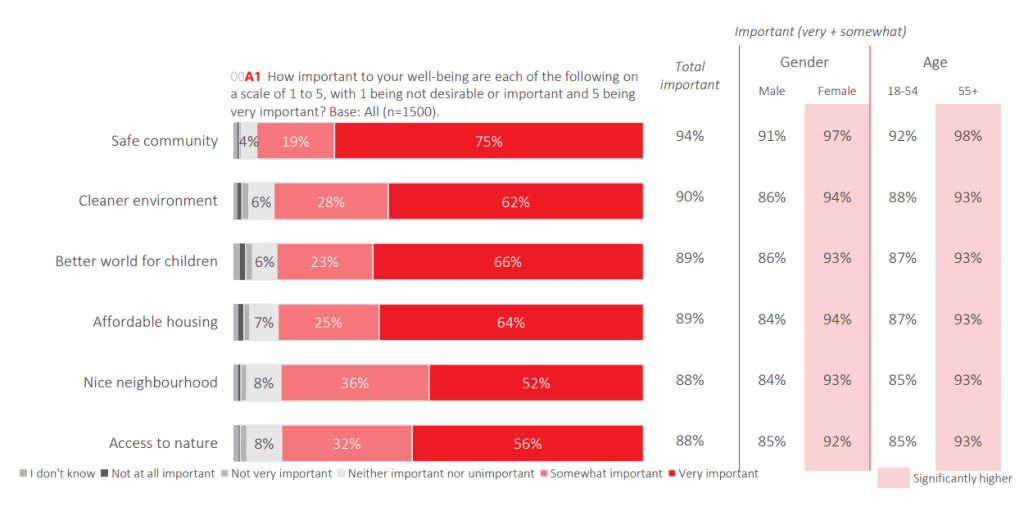
Importance of various factors on well-being.
Although not as important as the factors on the previous slide, the following six factors are considered important to at least two-thirds of Canadians: the creation of high-quality jobs (83%), less traffic congestion (76%), more free time away from work (74%), a high level of social equality (73%), a bigger economy (67%), and social cohesion (66%). However, unlike the previous slide, Canadians are split as to the level of importance these factors have on their well-being: nearly as many (or more) Canadians rate these factors as somewhat important as very important. Demographically, women are more likely to consider the creation of high-quality jobs, less traffic congestion and high social equality as important compared to men.
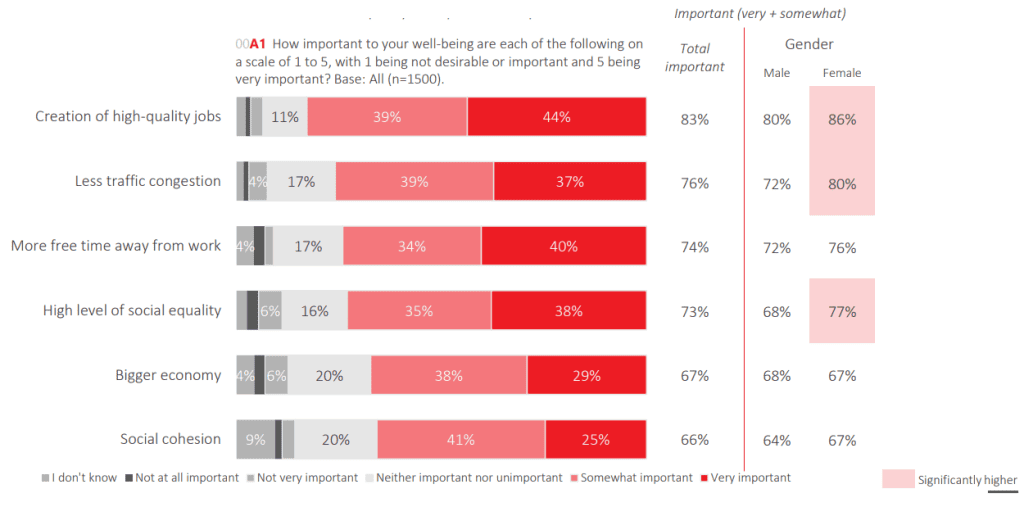
Importance of various factors on well-being.
Compared to the twelve factors listed on the previous two slides, the following four factors are considered important by relatively few Canadians: 42% consider increasing urban sprawl and farmland loss important, 35% consider more consumer goods important, 29% consider a larger population in Canada to be important, and 21% consider a big house important. Those over the age of 54 are more likely to consider increasing urban sprawl and a larger population in Canada to be important compared with younger Canadians, while younger Canadians are more likely to feel a big house is important to their well-being. Men are more likely than women to consider a larger population in Canada and a big house to be important
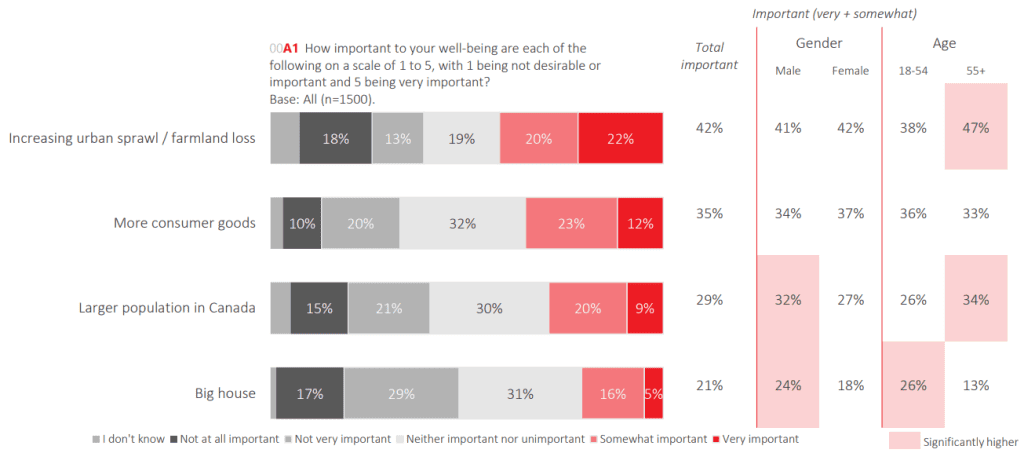
In general, agreement is low with the following statements.
Four-in-ten (38%) believe that reducing the world population would help relieve poverty and human suffering, particularly men (41%) compared with women (35%). Most do not believe Canada should allow cheap labour into the country to support companies which pay low wages (61% disagree), and have not been forced to move due to increased housing costs, too much traffic and/or crime (60% disagree). Few (19%) believe immigration should be used to change the ethnic and cultural makeup of Canada, although nearly four-in-ten (37%) are neutral or don’t know. While agreement with most statements is low, Canadians aged 18-54 are more likely to be among those who agree with three out of four of the statements (vs. those 55+).
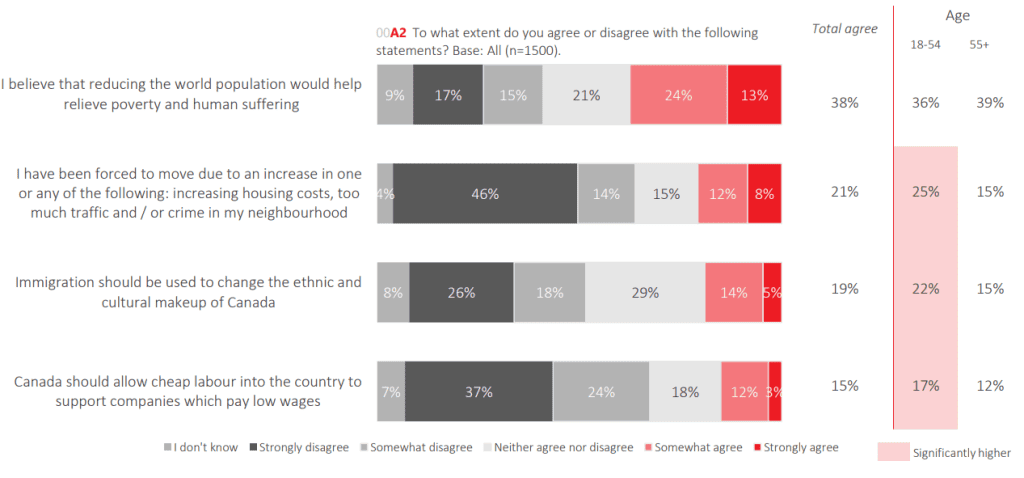
Over half of Canadians (54%) believe the quality of life has declined in Canadian cities in the last forty years.
Women (vs. men) and those aged 55+ (vs. those 18-54) are particularly inclined to hold this view. However, two-in-ten (20%) believe that the quality of life in Canadian cities has improved in the last 40 years, particularly men (24% vs. 17% of women) and those living in Quebec (29% vs. 18% among the rest of Canada). 17% do not believe the quality of life in Canadian cities has changed.
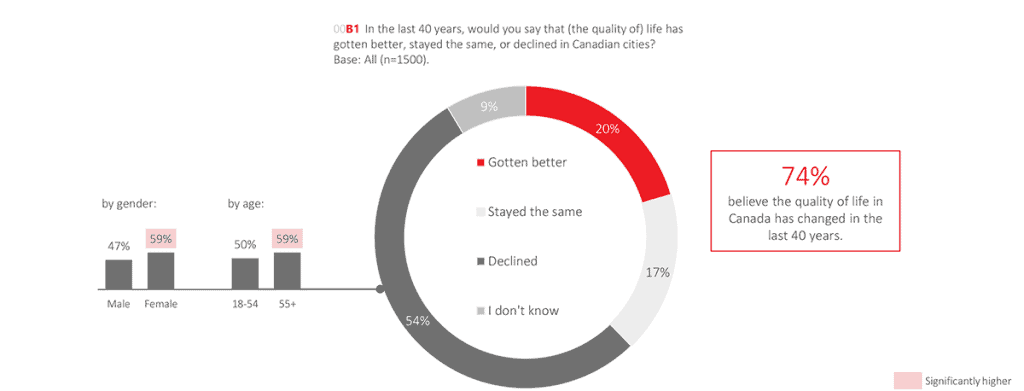
Among those who are working, the vast majority work only one job.
In fact, 57% of Canadians are currently in the workforce, and 45% of them work a single job. However, some in the workforce work multiple jobs (11% of Canadians overall). Those who work multiple jobs are more likely to be younger (16% of 18–54-year-olds vs. 4% of 55+) and living in Alberta (20% vs. 9% in BC, 8% in Quebec, and 8% in Atlantic Canada).
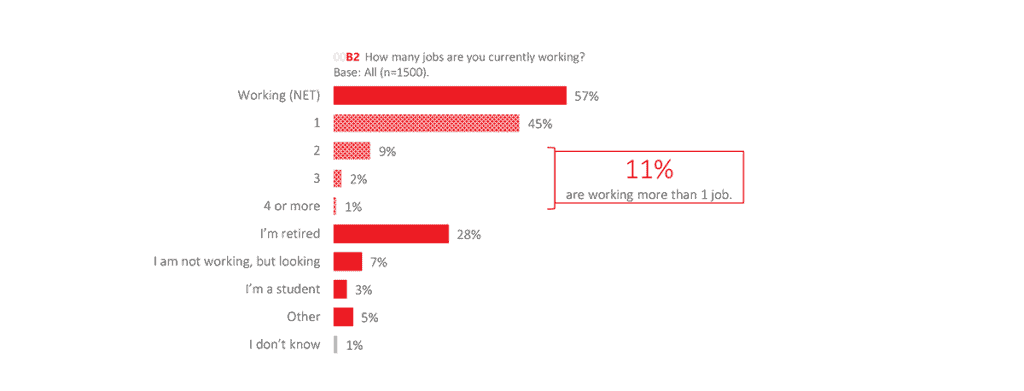
Overall, first impressions of the idea of tripling Canada’s population by 2100 are largely unfavourable.
Six-in-ten (60%) describe their initial thoughts on this idea as ‘bad’, but impressions are split as to how bad; 32% think it’s a bad idea, while slightly fewer (28%) think it’s a very bad idea. Around one-in-ten (13%) think this is a good idea, although just 2% feel it’s a very good idea. Nearly three-in-ten (27%) are neutral or don’t know how to feel about this idea. Canadians aged 35+ are more likely to feel that this is a bad idea (64%) compared to the youngest cohort measured (51% of those 18-34), as are those living in a rural area (68% vs. 58% of those living in an urban/suburban environment). Men are more likely to think that this is a good idea (15% vs. 10% of women), while women are more likely to not know how to feel about this idea.

Canadians are split on the ideal place to live.
For example, three-in-ten would like to live in a small city (29%) or in the country (27%), yet two-in-ten would prefer living in a small town (21%) or a large city (18%). It’s worth noting that where Canadians are currently living is generally where they would choose to live, if they could live anywhere: urban dwellers would rather live in a city (large or small), suburban dwellers would rather live in a small city or small town, and rural residents would prefer to live in a small town or the country. Age also plays a factor: younger Canadians (18-54) would rather live in a large city (22% vs. 12% of 55+), while older Canadians 55+ would rather live in a small town (27% vs. 17% of 18-54). Region is also significant – Atlantic Canadians are the least likely to be interested in living in a small city, compared with every other province (15% of Atl. residents vs. 30% elsewhere in Canada). Atlantic Canadians (46%) and Quebecers (36%) are more likely to be interested in living in the country (vs. 23% elsewhere in Canada), while British Columbians are most likely to be interested in living in a large city.

At least half of Canadians believe an increase in population in the GTA, Vancouver, and Montreal would worsen the following situations.
More than three-quarters believe an increase in population would worsen the preservation of farmland (78%), access to nature (76%), and housing affordability (76%), while around two-thirds feel it would worsen a healthy environment (73%), quality of life (66%), and efforts to address climate change (66%). Six-in-ten believe it would worsen species extinction (64%) and personal health (60%), while slightly more than half feel it would worsen job quality (55%), wages (54%) and social cohesion (53%). In nearly all cases below, those aged 35 and up are more likely to believe an increase in population would worsen each situation compared with younger Canadians. Notably, while those living in rural areas are more likely to believe a population increase would worsen several situations below, those who actually live in these cities already (i.e., those living in urban and/or suburban areas) are more likely to feel that an increase in population would improve several situations below.

While nearly half believe the annual rate of immigration should be at least somewhat less than the current level…
….there isn’t any real consensus on what the annual rate of immigration should be. Those who believe immigration should be at least somewhat less than the current level are divided: a quarter (25%) believe the rate of immigration should be just enough to balance the number of people who leave, while 19% believe it should be much less than the current level. Only 5% believe Canada should not accept any immigrants. On the other hand, two-in-ten believe the annual rate of immigration should be higher than the current level, with 15% saying Canada should accept a little more than the current rate, and 3% saying they should accept a lot more. Two-in-ten (20%) believe the current level of immigration to Canada is good. Certain demographic subgroups are more likely to think that the annual rate of immigration should be less than the current level: (1) those
living in the Atlantic (66% vs. 48% elsewhere in Canada), (2) rural (57%) and suburban (51%) dwellers (vs. 44% of urban dwellers) and (3) CPC voters (67% vs. 36% apiece of Liberal and NDP supporters).
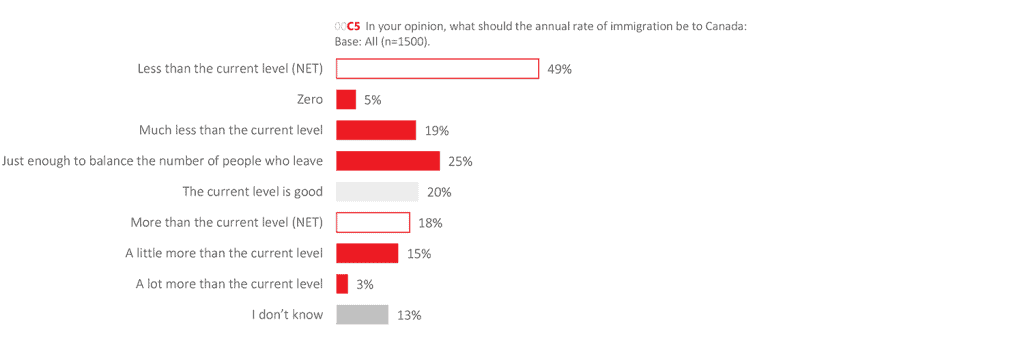
When it comes to immigration policy in Canada, six-in-ten (63%) feel that ensuring the lives of Canadians are improved with the addition of immigrants should be the most important goal.
In particular, Canadians aged 35 and up (65% vs. 56% of those 18-34) and CPC voters (75% vs. 62% of Liberal voters and 58% of NDP voters) are inclined to be of this opinion. Significantly fewer feel that Canadian immigration policy’s most important aim should be to help make the lives of prospective immigrants better (18%) or help address problems in other countries (7%). Quebecers (28% vs. 15% elsewhere in Canada) and Liberal (28%), NDP (27%) and Bloc (28%) voters (vs. 9% of CPC voters) are more likely to believe that immigration policy in Canada should aim to help make the lives of prospective immigrants better.

The majority of Canadians (56%) believe Canada should both train their own residents to be professionals and bring in foreign trained immigrants.
Those aged 55 and up (62% vs. 51% of 18-54), residents of British Columbia (64%) and Quebec (62% [vs. 52% in other provinces]), and Liberal (67%), NDP (67%) and BLOC (64%) voters (vs. 44% of CPC voters) are particularly likely to believe that Canada should have both domestically trained residents and foreign trained immigrants. However, over a third (36%) believe Canada should exclusively train its own residents, particularly CPC voters (50% vs. 26% of Liberal and NDP supporters). Only 4% believe foreign trained immigrants should be used exclusively in various professions.

At least half of Canadians are worried about the issues below.
The issues Canadians are more worried about are farmland loss (75%) and climate change (72%), followed by food security (69%) and species extinction (67%). Canadians are the least worried about the welfare of their children (63%), energy security (61%) and personal debt (56%), although the level of concern is still high. Women are more likely to be worried about every issue measured compared with men, and those over 54 are also likely to be more concerned about many of the issues than those under 55. However, younger people (18- 54) are more likely than those 55+ to be worried about personal debt.
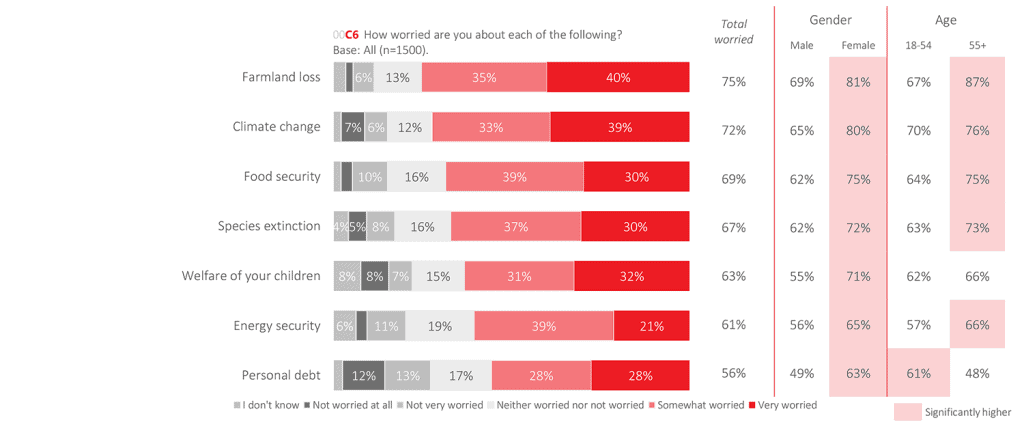
Canadians are most upset about housing/rent costs, with eight-in-ten (80%) considering themselves at least somewhat upset about it.
Many are also upset about actions of what they perceive to be corrupt politicians (71%), declining standard of living (71%), and pollution (67%). Fewer, but still the majority, are worried about more crowded cities and towns (61%), reporting from what they perceive to be biased media (55%) and urban sprawl (53%). In general, women are more likely than men to be upset about most of these situations in their community, as are those 55+ (vs. those under 55).
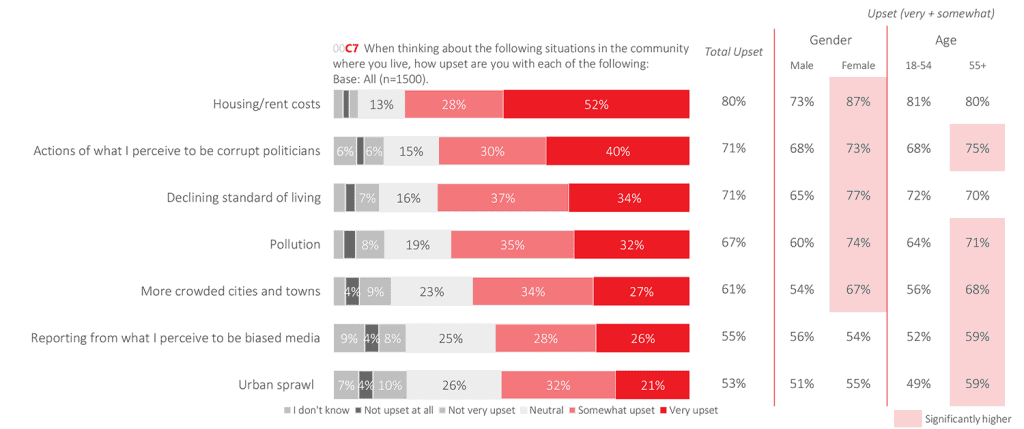
More Canadians feel Canada is doing a poor job than a good job addressing the issues
In fact, half of Canadians think Canada is doing a poor job on addressing income inequality (52%) and preparing for future climate and resource depletion threats (49%). Many also believe Canada is doing a poor job on fighting climate change (44%), conserving wildlife habitats (43%) and creating high quality jobs (41%). Two-in-ten or less believe Canada is doing a good job addressing the issues below, and only 2%-3% believe Canada is doing a very good job. However, it’s worth noting that neutral and I don’t know responses are high for each measure – approximately a third of Canadians or more are neutral or unsure how Canada is performing on the issues below.
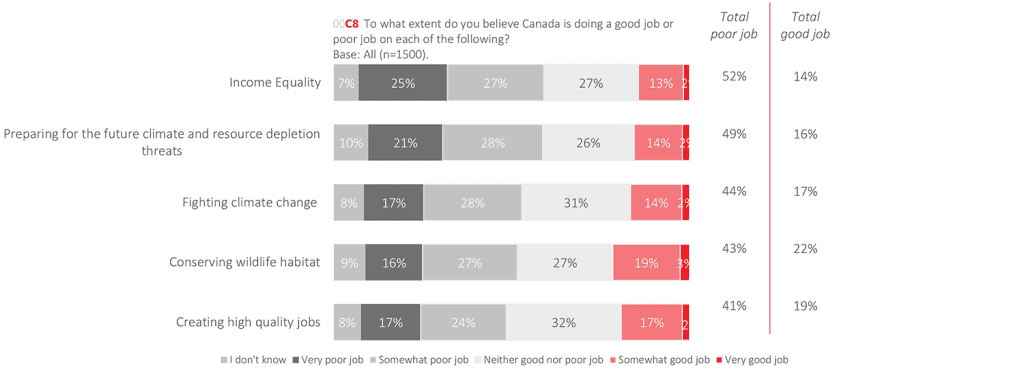
Approximately the same proportion of Canadians believe former politicians should (41%) or should not (44%) be allowed to work for companies which benefitted from their decisions when in office.
However, of the 41% who believe that politicians should be allowed to work for companies which benefitted from the decisions those politicians made while in office, the vast majority (or 36% of Canadians overall) believe that it should only be allowed after a specified period of time has passed and with full public disclosure. Very few (5%) believe they should be permitted to do so with no conditions. Men (47% vs. 41% of women) and those aged 35 and up (48% vs. 35% of 18-34) are more likely to believe that politicians should never be allowed to work for a company who benefitted from their decisions made in office. Women and younger Canadians are more likely to be uncertain whether or not this should be permissible.
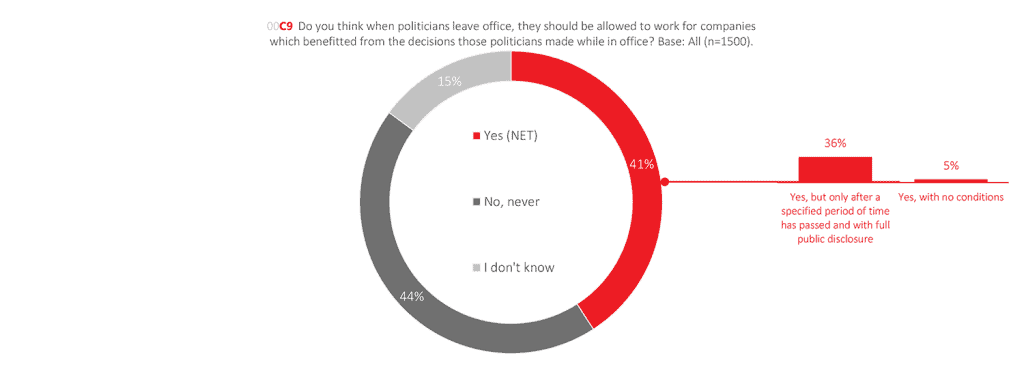
Agreement is strongest with statements related to political donations and links to developers.
In fact, over seven-in-ten (72%) agree at least somewhat that Canada should enhance and enforce political donations rules, and six-in-ten (59%) agree the RCMP should form an organized crime task force to investigate the links between developers and politicians. Agreement with other statements is much lower (and it should be noted that most only somewhat agree, rather than strongly agree): 30% agree the democratic system in Canada is healthy, 27% agree media corporations provide balanced news coverage that reflects reality and their priorities, 26% agree we can continue to grow forever as there are no challenges humans cannot overcome, and 23% fear discussing immigration issues with someone employed by a media corporation. Older Canadians are more likely to agree with almost all statements, although younger Canadians are more likely than older Canadians to be afraid of discussing immigration with someone employed by the media.
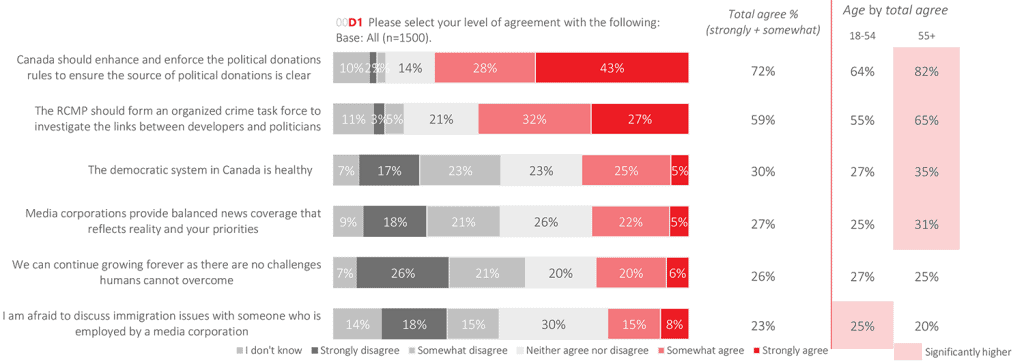
Eight-in-ten Canadians (83%) would consider taking at least one action to reduce their carbon footprint.
In fact, among those who said they would consider taking some action, an average of nearly 3 actions were selected. The top two actions Canadians would be willing to take are (1) keeping things longer (66%), and (2) buying less stuff/material goods (57%). Four-in-ten (39%) would consider buying an EV for their next vehicle, but fewer would consider installing a heat pump to heat their home (28%), traveling less (24%), downsizing from their current residence (19%) or having fewer children (17%). Younger Canadians (18-54) are more likely to consider buying an EV (43% vs. 33% of 55+) and having fewer children (particularly 18–34-year-olds [28%] vs. 12% of 35+). One-in-ten (10%) would not do anything to reduce their carbon footprint, particularly men (13% vs. 7% of women), those over the age of 34 (11% vs. 6% of 18-34), and rural dwellers (14% vs. 9% of urban/suburban dwellers).
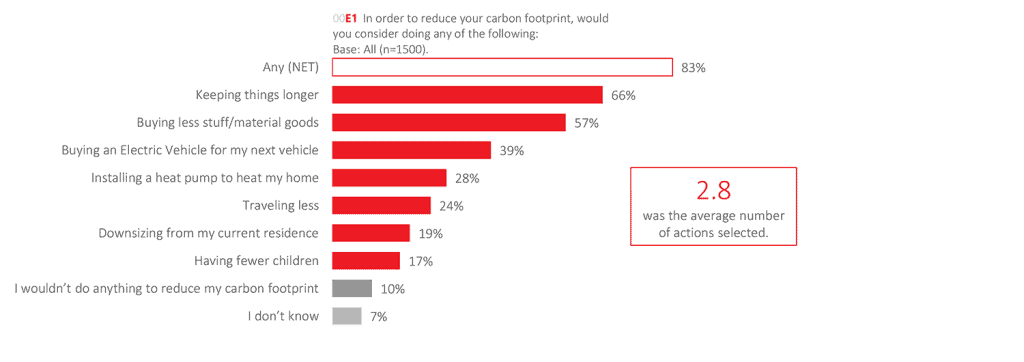
A slim majority would not vote for a political party that promised to reduce immigration, but they would vote for a political party that promised to stabilize Canada’s population at the current level.
40% would not vote for a party that promised to reduce immigration, but 31% would. On the other hand, 38% would vote for a party that promised to stabilize Canada’s population at the current level, but 27% would not. For both statements, those who believe the quality of life in Canada has declined in the past 40 years and those who believe Canada’s rate of immigration should be less than the current level are more likely to say they would vote for a political party that campaigns on these promises (vs. those who believe the quality of life has improved or not changed, and those who believe the current level of immigration should be kept or increased, respectively). However, it’s important to note that a large portion of respondents (i.e., approximately a third) simply don’t know how they would vote on these issues.
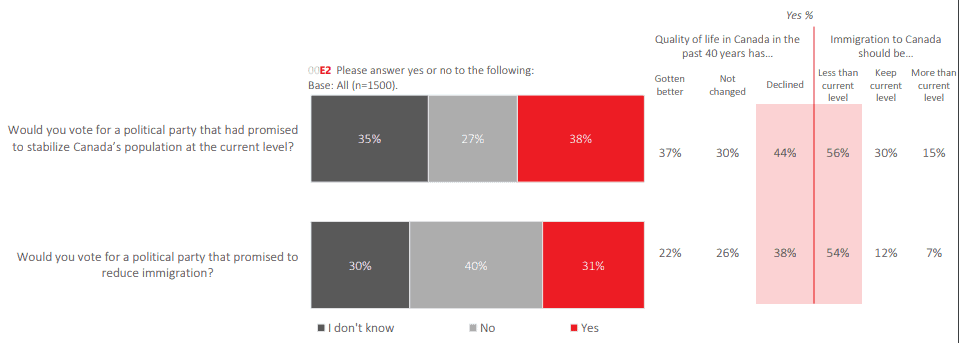
Demographics
Respondent profile
Base: All (n=1500)
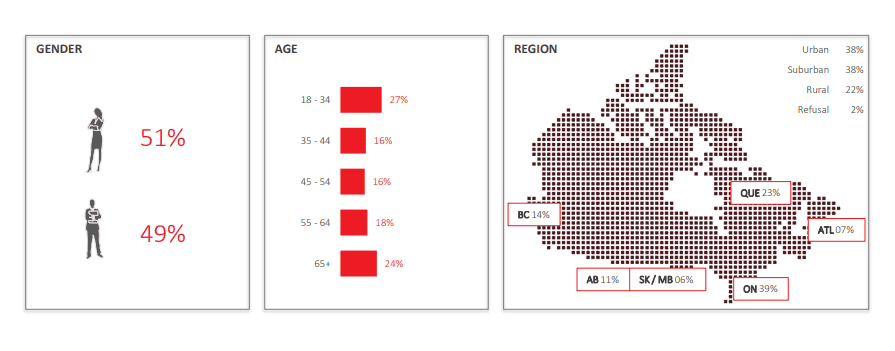

Committed Vote + Lean
Base: n=1175


Follow Along on Canada's Path to Sustainability
Stay in touch with us so we can share news, updates, and let you know about anything more you can do to affect change in Canada, and globally. This is by far the best way to stay in touch – make sure you mark our contact as safe where necessary to avoid our emails getting buried in spam or promotional folders.

